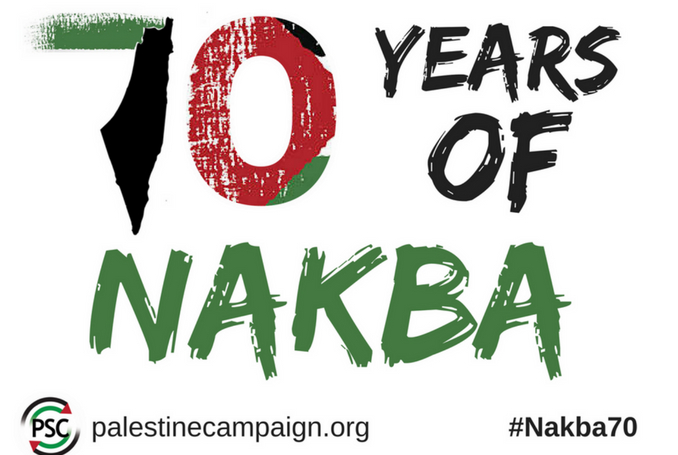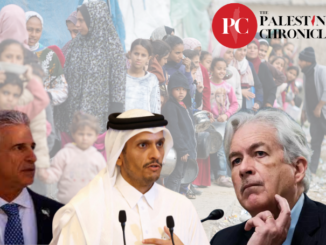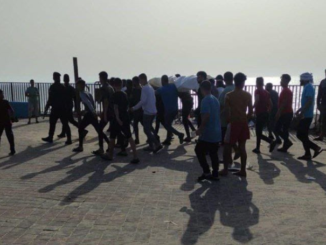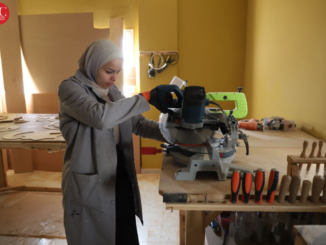
By Blake Alcott
The UK Palestine Solidarity Campaign (PSC) held an all-day Right of Return Conference on Sunday, May 20 in London, attended by about 150 people. The event resulted from a motion at PSC’s Annual General Meeting in January 2017 to thus commemorate 70 years since the beginning of Zionism’s ongoing ethnic cleansing.
PSC Chair Hugh Lanning began by acknowledging that PSC and the wider solidarity movement has paid too little attention to the Palestinians displaced from their homes in the territories occupied in 1948 (Israel) – including their descendants, over two-thirds of all Palestinians. The solidarity group had focussed largely on Palestinians now living between the river and the sea.
Although following this up with a plea for PSC to focus after all not on the refugees but on arms trade with Israel, it is hoped that this is just the beginning of increased recognition of the centrality of the future of the refugees. And as Hugh emphasized, the Great March of Return protests of this April and May have brought the fate of the forcibly exiled back into the spotlight.
Hazem Jamjoum, a Policy Member of Al-Shabaka and doctoral candidate in Middle East History, led off with a welcome radical view of the place of the expelled Palestinians in international law and perhaps more importantly in politics since the law results from power relations. Much less, according to him, is the issue a humanitarian one.
Hazem Jamjoum from @AlShabaka: Palestinians are not demanding the Right of Return – we have this right, we are demanding the implementation of this right. The law is our side, this is a political issue #RORConference
— PSC (@PSCupdates) May 20, 2018
After observing that the Palestinian Authority is part of the problem rather than the solution, running as it does a “police state” as subcontractor for Israel and its powerful supporters, Hazem underlined that Palestinians do not demand the right of return, as they already have this both in international law and on ethical principles; rather, they demand actual, real return.
He reminded the audience that historically Europeans and North Americans – as at the Evian Conference in 1938 – had always designated Palestine rather than Europe or North America as the place to go for Jews under persecution in Europe (not in the Near East), rather than opening their countries to them. Now, 80 years later, an instance of how ethnic cleansing is ongoing is the probable expulsion of the 250,000 Palestinians living in Area C of the West Bank.
Ironically, Zionism agrees with the Palestinians in also holding that those who are (even only allegedly) from a place have a right to return to it. Finally, solidarity focus must return to expulsion, return and national liberation.
The PSC conference – #Palestinian #Refugees and the Right of Return – aims to educated&provide the tools for #UK #activists to #campaign for the right of return of Palestinian refugees, as enshrined in International #law. https://t.co/Ss1U9vUDnQ @PSCupdates 20th May @RADA_London pic.twitter.com/40ir9ouUHW
— @70 (@70Palestine) May 7, 2018
Barrister Salma Karmi followed with an overview of return’s unshakable grounding in international law. Like many other speakers, she broke down ‘right of return’ (RoR) or ‘repatriation’ into an actual physical return, property restitution, compensation, and re-enfranchisement where they had been Mandate-Palestinian citizens until stripped of their citizenship by Israel.
She pointed out that because a descendant of an expelled Palestinian cannot ‘return’ to a place he or she has never been, international law speaks rather of ‘right of entry’; the result is that the 6-7 million Palestinians living outside historic Palestine, the perhaps 3 million expellees living in the West Bank and Gaza Strip, as well as perhaps 300,000 persons ‘internally displaced’ within Israel, all enjoy the undiminished right to take up residence in Palestine.
Of course Paragraph 11 of UN General Assembly Resolution 194 of 11 December 1948 (one day after the GA passed the Universal Declaration of Human Rights) is the basic statement of Palestinians right to return to their homes, not merely to Palestine, and has been reaffirmed by the UN every year since.
Thus Resolution 194 is a special resolution having the status of jus cogens; it is in other words binding or ‘customary’ law. But Salma pointed out that it was actually a re-statement of already-existing international law, based in the Law of Nationality which renders it the duty of Israel to other states to repatriate refugees, and based as well in the Law of State Succession which requires a state, after a change in sovereignty in a particular territory, to grant all previous ‘habitual residents’ enfranchisement (and of course return if they fled or were expelled).
The key is the symbol of return used by Palestinians & solidarity activists. On June 5th, at the global #GreatReturnMarch, hold up a key in support of the #RightOfReturn, and to mark #Nakba70. Details of all UK events on June 5th are here: https://t.co/ZwxzNOKnX4 #FreePalestine pic.twitter.com/dGJXuuBM8y
— PSC (@PSCupdates) June 1, 2018
Humanitarian law and human-rights law, as well, both support return for anyone with ‘genuine links’ to a territory, in this case, Palestine – support rooted in the Universal Declaration of Human Rights and in the International Covenant on Civil and Political Rights.
Salma took pains to outline some Zionist or Israeli arguments against return, for instance, that its security or public order would be threatened, or that the rights of others would be endangered. But these do not hold up, and forcible expulsion remains a crime as it already was in 1948. The right of return moreover challenges the Jewish nature of the state of Israel. Finally, any two-state ‘peace deal’ would legitimize forcible displacement – a bad thing for all present and future refugees, not just the Palestinian ones.
Rania Madi, a long-time associate of BADIL the Resource Center for Palestinian Residency and Refugee Rights, estimated the number of Palestinians enjoying the right of return at 7.8 million. She noted the contradiction between UNGA Resolution 181 of 29 November 1947, which recommended turning a large part of the Palestinian homeland over to the Jewish people, and Resolution 194, which demanded a return which would have left Jewish residents of that part of Palestine a distinct minority.
Further delving into the history of Palestinian displacement, she reminded us that UNGA Resolution 273 of 9 May 1949 admitted Israel to membership in the UN on condition that it fulfill its promise to honor Resolution 194; its reneging on this promise has, of course, potential consequences for Israel’s further UN membership. Finally, she pointed to the post-1967 expulsions of 200,000 Palestinians from Jordan after Black September in 1970, of tens of thousands from Kuwait, Libya and Iraq, and very recently of Palestinians from Syria.
Our next speaker is Rania Madi, UN Legal Advocacy Consultant with @BADIL_Center, the Resource Center for #Palestinian Residency and #Refugee Rights. Rania is sharing her personal experience of being expelled and being denied her right to return by #Israel. #RORConference
— PSC (@PSCupdates) May 20, 2018
She also tied the individual issue of return and repatriation to that of the right to self-determination for the Palestinian people as a whole as written down in Article 1 of the 1966 International Covenant on Civil and Political Rights.
As did Rania and panel Chair and PSC Vice-Chair Kamel Hawwash, speakers on a panel of exiled Palestinians related their personal experiences under the theme ‘Discourses of Return’. While this panel was somewhat academic and unfocused, Mohammed Fahed from Lebanon expressed his opinion that having rights in Lebanon would, contrary to an often-heard view, actually strengthen the fight of Palestinians in Lebanon for their return to Palestine. He characterized return not as a ‘patriotic’ duty but as a human right, emphasized that return did not at all entail getting rid of Jews now living in Palestine, and said that a one-(democratic)-state (ODS) solution would be more conducive to his return than a two-state solution.
Mohamad Fahed, a young Palestinian who grew up in a refugee camp in #Lebanon & graduated from UCL, talks about the responsibility of Arab countries to treat #Palestinian refugees with dignity. In Lebanon, Palestinians are forbidden to own properties and banned from many jobs
— PSC (@PSCupdates) May 20, 2018
Sarona Bedwan, like fellow panelist Tamara Be Halim a member of the staff of Makan, a UK charity seeking to reframe and de-mystify the Palestine-Zionism conflict, related variously that Palestinian displacement involved further Israeli crimes such as the theft of books and other cultural goods, spoke more of ‘creating a vision’ than of ‘going back’, and brought up the tension between Palestinian ‘equality’ with other residents of Palestine and the ‘liberation’ of Palestine. She also noted that open talk of anti-Zionism has become easier and more common.
Sarona Bedwan, Palestinian-American MSc student & Communications Officer at Makan, insists on the importance of oral stories in Palestian memory work. Many books about #Palestine were stolen by the Haganah & are now part of Israel's archives and difficult to access #RORconference
— PSC (@PSCupdates) May 20, 2018
Tareq Baconi, an analyst at Al-Shabaka, attested that at least outside Palestinian ‘leadership’ circles a re-calibration of the discussion is presently taking place, returning to the gist of the conflict, namely the cleansing of non-Jewish Palestinians and their plight; the current Great March(es) of Return in Gaza is evidence of this.
He also argued against talking about solutions (one-democratic-state, two-state) in favor of focusing on values, rights and the dismantling of supremacy. He later clarified that even if return could very well mean the replacement of the Jewish state, it is foolish to now abandon the two-state framework which grants Palestine a certain recognition within the 1967 borders, assures it of some external political support, and puts certain legal tools into the hands of the Palestinian Authority for use in fora like the UN and the International Criminal Court. He seemed to argue that talking about solutions could endanger certain ‘sources of power’ that Palestinians would have to relinquish if they explicitly abandoned the two-state solution.
Tareq Baconi – writer, journalist & analyst at @AlShabaka: "the use of lethal force on protesters in Gaza is about Israel's fear to see the Right of Return infiltrating the #Palestinian consciousness again, the fear to see Palestinians demanding their core rights" #RORconference
— PSC (@PSCupdates) May 20, 2018
Ghada Karmi then implicitly contradicted this view, arguing that there is no solution at all without the justice achieved by return, and that return is impossible within the two-state framework, one of those two states presumably being the Jewish state of Israel.
She controversially suggested a path towards reaching an eventual re-united Palestinian state, open to all Palestinians – namely, full equality as citizens for all people now residing between the river and the sea (by the way divided about 50/50 between Palestinians and Jewish Israelis). This could be done without prejudice to – indeed as an open step in the pursuit of – the right of return. While it is emotionally difficult for many Palestinians to even imagine voluntarily becoming citizens of the oppressor state Israel (defined moreover as a Jewish state), this tactic has the advantage of shedding the farce of Palestinian control of the West Bank and Gaza Strip and presenting the world with a clear apartheid situation, something world opinion has experience in overcoming.
Dr Ghada Karmi, leading Palestinian activist, academic and writer: “there is no solution with #Israel without the Right of Return” #RORConference pic.twitter.com/UX8Jltl1PI
— PSC (@PSCupdates) May 20, 2018
Eitan Bronstein, founder of Zochrot and co-founder of De-Colonizer, was aware of his unique position at the conference as the only Jewish Israeli, but it goes without saying that he was warmly welcomed. He related his and like-minded people’s work in documenting and drawing attention to the hundreds of villages, towns and land areas whose former Palestinian identity has been systematically eradicated, built over and planted over. Restoring place names and making Palestinian history visible is a basic step to awareness that return is literally return – to a country, places, and homes.
Eitan Bronstein at @PSCupdates #RORConference. Explaining discourses of Nakba denial in Israeli society. pic.twitter.com/WXKiWNYwPl
— PSC (@PSCupdates) May 20, 2018
Three issues were mentioned which need much further discussion: 1) Should we continue to emphasize the legal status of right of return, or focus more on the ethical reasons why return is in principle universally accepted? 2) Should we argue that Palestinians have the right to re-enfranchisement (as citizens of whatever state rules Palestine), whether or not they physically return? 3) Considering that in 1948 about 93% of the land of Palestine was in Palestinian or government ownership, what does property restitution mean for those now living on that immense property?
It is also important to involve the Palestinian Return Centre in future Return activities, as well perhaps as the young movement Palestinians Abroad, which will hold its second large conference in Istanbul this June. The logical and tactical relations between RoR and both BDS and ODS should also be spelled out and developed within the solidarity movement.
Third panel discussion starting now, with 4 Palestinian speakers talking about Palestinian discourses of Return #RORConference #Nakba70 pic.twitter.com/n3cPfBIRYi
— PSC (@PSCupdates) May 20, 2018
PSC Director Ben Jamal delivered an inspiring closing statement, reaffirming the organisation’s commitment to return and noting that we can build strong arguments on the basis of the 2017 study by Richard Falk and Virginia Tilley showing that the concept ‘apartheid’ applies not only to those in the West Bank, Gaza Strip, and Israel but also to those not present in historic Palestine. He also looked forward to a day of action on June 5 and to a large conference on Israeli apartheid in November.
Many causes have seemed Utopian: ending slavery, women’s suffrage, replacing South African Apartheid with a normal democracy, and even Zionism were initially put down as unrealistic, but they happened. So can return and the other forms of redress and reinstatement it implies. The author welcome any comments or corrections to this article.
– Blake Alcott is an ecological economist and the director of One Democratic State in Palestine (England) Limited. The author welcomes any information on ODS or bi-nationalism activity sent to blakeley@bluewin.ch. He contributed this article to PalestineChronicle.com.









Thank you for this report of this conference. How many ideas brought into this conference, some more or less acceptable than others! The position of the Thora Jews, for whom the existence of a Zionist entity is unacceptable, lacks; Zionism is an attack on Jewish identity, and its realization as a “state” and the crimes of the Zionist regime through colonization and apartheid politics transgress the Torah and International Law. I remind that authentic Jews faithful to the Torah distance themselves from Zionist politics and live outside of historic Palestine because of the Divine Decree of Exile and Dispersion.
I admit that there are far too many orthodox Jews (a few hundred thousand), even anti-Zionists or non-Zionists who are installed in Palestine; for some of them, they are there for good spiritual motivations, but for most of them, they were trained by the Zionist propaganda distilled each year in the Jewish communities in the world where the leaders are big religious Zionists. If I had been to this conference, I would have developed these points.